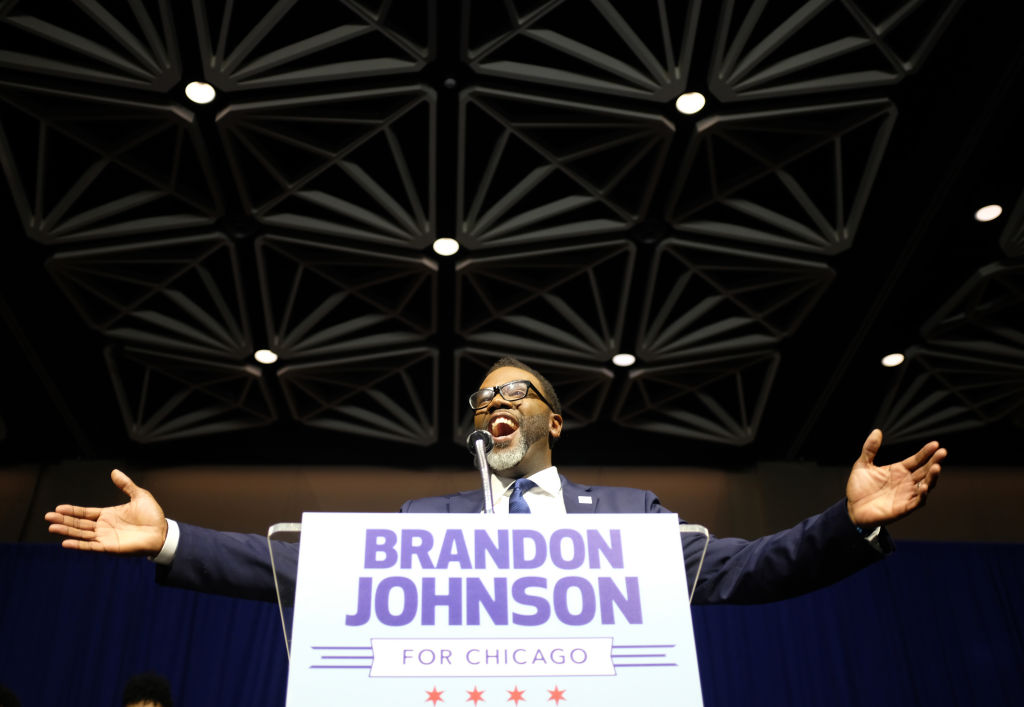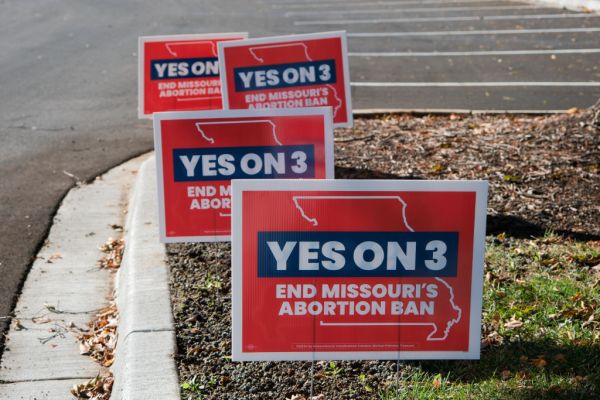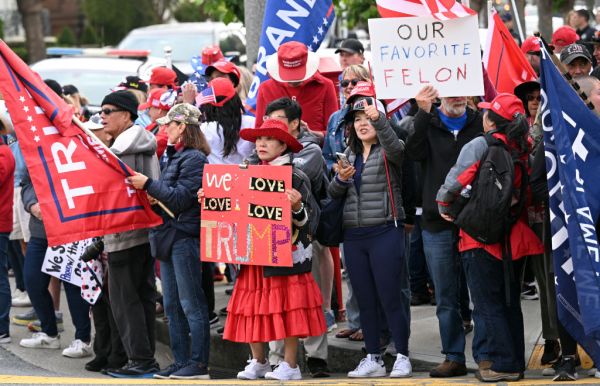Happy Thursday! A study published last week in the journal Cell found some “damaged or dehydrated” plants “emit high-pitched sounds,” but “not on purpose.” To which we say: Same.
And on a completely unrelated note, Chag Pesach Sameach to all who have begun celebrating Passover.
Quick Hits: Today’s Top Stories
- Taiwanese President Tsai Ing-wen met with House Speaker Kevin McCarthy and a bipartisan group of lawmakers on Wednesday at the Ronald Reagan Presidential Library outside Los Angeles—despite China’s warnings the summit would draw unspecified consequences. McCarthy is the highest-ranking official to meet with Taiwan’s leader on American soil since the United States established formal diplomatic ties with China in 1979, and he declared the U.S.-Taiwan bond “stronger now than at any time.” The speaker called for more arms sales to—and economic cooperation with—the island democracy.
- A spokesman for Mike Pence said yesterday the former vice president will not appeal a court ruling ordering him to testify before the grand jury investigating former President Donald Trump’s efforts to overturn the 2020 presidential election. Pence had argued his role as president of the Senate during the January 6 attack on the Capitol exempted him from testimony under Congress’ “speech or debate” clause, but Chief U.S. District Court Judge James Boasberg ruled Pence couldn’t be exempted from testifying—though his position does limit what questions investigators will be allowed to ask.
- The Justice Department announced Wednesday it reached a tentative $144.5 million settlement with the 22 people wounded and families of 26 people killed in a 2017 shooting at First Baptist Church in Sutherland Springs, Texas. The plaintiffs had alleged the government was negligent, since the Air Force failed to update records—including a domestic violence condition in military court—that would have prevented the shooter from obtaining a gun.
- Maryland State Attorney General Anthony Brown released a 463-page report on Wednesday accusing Catholic Church officials in Baltimore of concealing for decades the abuse of 600 children—though he claimed the true number of victims is “likely far higher.” The report—published after a four-year investigation—named 156 alleged abusers, and said certain parishes were known to house more than one predator at a time.
- Republican Indiana Gov. Eric Holcomb signed a measure into law on Wednesday banning treatments like hormone therapy, puberty blockers, and gender transition surgeries for minors—joining at least a dozen other states that have implemented similar restrictions. The law is set to take effect July 1 and will require transgender minors currently taking transition medication to stop by the end of the year. The American Civil Liberties Union has already filed a challenge.
- Anti-vaccine activist Robert F. Kennedy Jr. filed paperwork on Wednesday to launch a long-shot presidential bid. He will join self-help author Marianne Williamson in challenging President Joe Biden for the Democratic nomination in 2024.
- A pre-dawn tornado killed at least five people in southeastern Missouri on Wednesday and injured five others, State Highway Patrol Superintendent Eric Olson said—the third such major storm to hit the Midwest over the last two weeks.
Let’s Go Brandon … Johnson

From Eric Adams in New York City to Brooke Jenkins in San Francisco, a number of big-city Democrats have been swept into office in recent years by promising to reverse their predecessors’ antagonism of the police and focus on reversing rising crime rates. They haven’t all been successful, of course, but Paul Vallas—a conservative Democrat and former Chicago Public Schools chief—was hoping to follow in their footsteps Tuesday and become the 57th mayor of the Windy City. He did not.
Instead, the surprise victor was Brandon Johnson, a progressive Cook County Board commissioner and former teacher’s union organizer. Vallas had secured plurality support in the first round of voting last month—33 percent to Johnson’s 22 percent—but Johnson more than closed the gap in this week’s runoff, leading Vallas 51.4 percent to 48.6 percent as of Wednesday night. The results are a boon for the political left and the city’s many public-sector unions, but Johnson now faces the difficult task of turning around a number of the city’s intractable problems, particularly crime.
Having performed so well in February’s election, Vallas was the presumed frontrunner in this week’s runoff: A poll conducted in recent days actually showed the more moderate candidate growing his lead over Johnson to 4 points. But Johnson’s campaign machine, including the powerful Chicago Teachers Union, made a significant get-out-the-vote push that ultimately put him over the top.
“Everybody was surprised by it,” Matthew Paprocki, president of the fiscally conservative think tank the Illinois Policy Institute, told The Dispatch. “Leading up to Election Day, all of the largest wards in the city of Chicago that had the most voter turnout were Paul Vallas strongholds. So it seemed like every indication was there.”
As we noted last month, crime and public safety were the No. 1, 2, 3, and 4 issues in the campaign. Chicago experienced the same widespread surge in violent crime that plagued cities across the country in 2020 and 2021, but those increases tended to start from a higher baseline. Carjackings have become a particularly visible problem. According to a February Northwestern University poll, 57 percent of all Chicago voters ranked crime as their most significant issue, but 46 percent strongly supported “decreasing police funding and investing in addressing root causes of crime.”
The seemingly contradictory viewpoints were represented in Chicagoans’ options this week.
Vallas, backed by Chicago’s Fraternal Order of the Police, emphasized the importance of boosting “proactive policing” to ensure more arrests are made for small and major crimes alike. “It is really time to make criminal activity illegal again,” Vallas said in December. “It seems that people can simply commit crimes with impunity.”
Johnson favored a different approach: addressing social conditions that contribute to higher crime, namely poverty and inequality. Late in the campaign, Johnson slightly warmed his positions on the police, promising he wouldn’t cut the police budget “one penny” and highlighting a plan to hire additional police detectives in an effort to drive down crime clearance rates.
Both candidates leaned into the contrast of their respective profiles. Vallas knocked Johnson for his association with the “defund the police” movement. Johnson hit Vallas hard on his association with Republicans.
“Paul Vallas invited the GOP into this race, they’ve endorsed him,” said Johnson last week. “The fact that he had 21 donors who also donated to Donald Trump.” Vallas has been a Democrat his entire political career, but he has expressed mixed views on abortion, received funding from Republican donors and groups including a school choice advocacy organization founded by Betsy DeVos, the secretary of education in the Trump administration, and claimed in a 2009 interview that he was “more of a Republican than a Democrat.”
Spending time telling people you are in fact not a Republican while running to be mayor of an overwhelmingly Democratic city is never good politically. The closet Republican message was likely more of a political albatross for Vallas than the defund the police ties were for Johnson. Democratic Sen. Dick Durbin endorsed Vallas on March 26 in an attempt to bolster Vallas’ bona fides. “In his heart, Paul Vallas is a lifelong Democrat committed to democratic values,” Durbin said. But it was too little too late.
Outgoing Chicago Mayor Lori Lightfoot had hammered Vallas on his Republican ties earlier in the race before the runoff. Lightfoot, who at the time considered Vallas to be her main challenger, ran ads labeling him a Republican. And late last month, fake Vallas campaign yard signs surfaced that had MAGA 2024 on them. Johnson’s campaign denied any involvement.
The mayor elect has an ambitious spending agenda to provide more funding for social programs and services such as anti-violence programs, mental health care, housing, and additional public school teachers. Johnson has proposed an $800 million tax increase to pay for it all.
Such a large increase has raised red flags among some business groups. The Chicagoland Chamber of Commerce along with several other business associations that endorsed Vallas sounded the alarm against Johnson’s tax policy proposals, labeling his plan an “extreme tax increase.”
“This is going to come from everything from a commuter tax to a head tax to a transaction tax,” Paprocki told The Dispatch. “If you start seeing businesses, as well, who say, ‘I can’t set up my headquarters in Chicago,’ and you start seeing a rooting out of major businesses and jobs happening in Chicago, there’s going to be devastating effects to the overall tax base.” Several large corporations including Caterpillar, Citadel, and Tyson Foods have exited the city in the last year.
Nonetheless, spreading the wealth is a core part of Johnson’s progressive vision for the city. “There’s more than enough for everyone in the city of Chicago,” he said in a post-election interview on Tuesday.
It remains to be seen whether Johnson’s agenda will be adopted by the city council. Some council members have already expressed reservations. “You don’t want to lose those jobs by putting such a heavy tax on that the restaurants close or the hotels have to restrict the work that they do,” said Scott Waguespack, the alderman for Chicago’s 32nd Ward.
“Campaign promises aren’t always things that can be kept,” Waguespack added. “When the rubber meets the road, there’s a lot of rules in place that prevent you from just doing whatever you want.” Portions of the tax increases including an aviation fuel tax would also require either state or federal approval.
The stakes are high for Johnson not only because of the problems facing Chicago, but also the potential for a moderate Democrat and conservative coalition of voters to defeat progressives in elections down the road.
“What we saw yesterday is a conservative candidate get 49 percent of the vote in the city of Chicago,” Paprocki told The Dispatch. “I think that is a wild number. And I think it shows major opportunities for a non-traditional group of fiscal conservatives, saying we might have to back people of different parties who believe in the same things that we believe in.”
Pro-tuh-SAY-witz Wins in Wisconsin
In the most expensive judicial campaign in American history—candidates spent a cool $42 million, nearly tripling the previous national record and quintupling Wiconsin’s—why not drop a little extra cash to make sure voters know how to address you? Taking a page out of Alaska Sen. Lisa Murkowski’s playbook, Judge Janet Protasiewicz ran an ad spelling out once and for all the pronunciation of her last name.
That preparation paid off Tuesday night: Pro-tuh-SAY-witz was on every Wisconsin politico’s lips as the liberal judge notched a 55-percent-to-45-percent win over conservative former Wisconsin Supreme Court Justice Daniel Kelly—a stunning margin in one of the nation’s tightest battleground states—and secured herself a 10-year term.
It’s easy for candidates and commentators alike to exaggerate the importance of any given election, but this one truly did carry some particularly high stakes. The ideological balance of the court was at play on a bench currently split 4-3 in favor of Republicans, but which will now be carried by liberals for the first time since 2008. In the coming years, the body will likely hear cases affecting abortion access, the contours of the state’s legislative maps, and perhaps even the outcome of the 2024 election—if 2020 is any indication. With so much riding on the outcome, it’s no wonder this race was both particularly expensive and particularly nasty.
Judicial races are ostensibly non-partisan affairs—traditionally, would-be judges campaign on judicial philosophies rather than desired outcomes and avoid prejudging issues that might appear before them once seated. Not so this time: As Harvest reported last month, these candidates spent the campaign offering their thoughts on some of Wisconsin’s—and the country’s–most controversial issues. Protasiewicz dove in first, centering her campaign on abortion access, while Kelly focused mainly on crime and what he considered his opponent’s weak sentencing record as a county judge.
When the Supreme Court overturned Roe v. Wade last summer, a 19th century Wisconsin abortion ban which makes exceptions only for “therapeutic abortions” necessary to save the mother’s life snapped back into place. A challenge to the law from Democratic Gov. Tony Evers’ administration will likely reach the Wisconsin Supreme Court after Protasiewicz has been seated—and she made no secret during the campaign of her belief in women’s right to choose. Ads underscoring her support for abortion access—and alleging Kelly supports the 1849 abortion ban—dominated the airwaves in Milwaukee and Madison, two Democratic strongholds.
After garnering enough support in February to advance with Protasiewicz to a runoff, Kelly criticized his opponent for being so plain about her stance on issues that may come before the court. “Protasiewicz [has promised] to set aside our law and our constitution whenever they conflict with her personal ‘values,’” he told supporters. “Never before has a judicial candidate openly campaigned on the specific intent to set herself above the law, to place her thumb on the scales of justice to ensure the results satisfy her personal interests.”
Protasiewicz, unsurprisingly, defended her approach. “Rather than reading between the lines and having to do your sleuthing around like I think people have to do with [Kelly], I think I would rather just let people know what my values are,” Protasiewicz said Tuesday before the results were in. And her novel approach to judicial campaigning—laying bare her values, while not explicitly stating how she would rule—seems to have paid off electorally.
After Protasiewicz’s resounding victory, it seems likely future judicial candidates will adopt the partisan tactics that served her so well—and brought in so much money (Protasiewicz and her backers spent almost 1.5 times as much as Kelly). “It would take the kind of forbearance that is kind of unusual among elected officials these days,” Katherine Cramer, professor of political science at the University of Wisconsin-Madison, told The Dispatch. “Just saying, ‘I’m not going to use these tactics, which appear to be quite useful electorally’—I think it’s going to continue.” Wisconsin Supreme Court elections are scheduled for every year from 2025 to 2030.
Kelly may have played coy about how his politics would affect his judgments, but his partisan bonafides were equally obvious. Reporting from the Milwaukee Journal Sentinel in February revealed he had been paid nearly $120,000 following his previous election loss to advise Republicans at the state and national levels on their efforts to overturn the results of the 2020 election—including consulting on a plan to put forth a slate of fake Electoral College electors for the state. A spokesman for his campaign confirmed the work, but added it’s “a maxim in the legal profession that the views of clients are not attributable to their attorneys.”
Wisconsin was the only state whose Supreme Court actually weighed in on former President Donald Trump’s attempt to have votes invalidated in order to change the results of the 2020 election. In December 2020, the Wisconsin Supreme court ruled 4-3—with one conservative joining the three liberal justices—against the outgoing president’s team and their effort to invalidate 28,000 votes. Joe Biden won Wisconsin by about 20,000 votes.
Democrats and other Trump opponents see Protasiewicz’s election as a bulwark against a 2020 redux in 2024. “Everything was on the line with this election. Everything,” former Milwaukee political reporter and columnist Dan Shafer wrote for his Substack. “Without a win [for Protasiewicz], the state would have descended back into what [Democratic] party chair Ben Wikler referred to as the ‘undemocratic doom loop.’”
And it’s not just national elections on the line. Although Democrats have won 14 of the last 17 state-wide races in Wisconsin, the GOP has a supermajority in the state Senate and a near-supermajority in the Assembly—thanks largely to a Republican-friendly legislative map that could find itself on the chopping block with the court’s new liberal majority. No lawsuits challenging the district lines are currently in the pipeline, but Protasiewicz called the map “rigged” during the campaign.
Meanwhile, despite emphasizing the need for forbearance during the campaign, Kelly proved a sore loser Tuesday—calling Protasiewicz “truly beneath contempt” in a concession speech that went a little off the rails. “I wish that I’d be able to concede to a worthy opponent, but I do not have a worthy opponent,” he said to a crowd of his supporters. “I wish Wisconsin the best of luck, because I think it’s going to need it.”
Worth Your Time
- As access to charter schools—including faith-based charters—grows across the U.S., the political left has a choice to make, Manhattan Institute senior fellow Andy Smarick argues in The 74 Million: Continue in steadfast opposition to school choice programs in general and faith-based charters in particular, or shape the wave. “It’s not inconceivable that five years from now there will be more than 100 state-level choice programs supporting millions of students in private schools, homeschools, and other options outside of the public system,” Smarick writes. “The left’s strategy could be to simply vote ‘no’ as this wave swells. An alternative is to support more school options and increased parental power inside a public system of transparency and accountability. That would mean sitting down at—not walking away from—the negotiating table on the issue of faith-based charters. When the Supreme Court eventually rules that states with charter school laws must permit faith-based charters, the left will be glad that they had a hand in crafting those programs instead of standing on the sidelines.”
- It begins: As artificial intelligence softwares invent convincing falsehoods when asked factual questions, libel lawyers are already considering what damaging fictions could be grounds for a lawsuit. “One night last week, the law professor Jonathan Turley got a troubling email,” Pranshu Verma and Will Oremus report in the Washington Post. “As part of a research study, a fellow lawyer in California had asked the AI chatbot ChatGPT to generate a list of legal scholars who had sexually harassed someone. Turley’s name was on the list.” The AI cited a nonexistent Washington Post article, inventing details like a class trip Turley says never happened. But spewing lies isn’t enough for a libel case. “Libel claims have to show not only that something false was said, but that its publication resulted in real-world harms, such as costly reputational damage,” the reporters write. “That would likely require someone not only viewing a false claim generated by a chatbot, but reasonably believing and acting on it.”
Presented Without Comment
Also Presented Without Comment
Also Also Presented Without Comment
Toeing the Company Line
- In the newsletters: The Dispatch Politics team also also covers Chicago and Wisconsin results, Scott warns policymakers (🔒) against overreacting to perceived threats from China, Jonah roasts anyone (🔒) declaring the rule of law is dead, and Nick points out (🔒) the disconnect between the GOP’s reaction to Trump’s indictment and its disappointing results in Wisconsin.
- On the podcasts: In a special Wednesday episode of Advisory Opinions, Sarah and David tear into the Trump indictment before moving on to a Twitter user convicted over trolling Hillary Clinton supporters, SCOTUS back-scratching, and Justice Ketanji Brown Jackson’s praiseworthy approach to equity.
- On the site today: Kevin writes that Dominion’s lawsuit against Fox News reveals what the network really thinks of its viewers, Harvest reports on a proposed Florida immigration bill that critics say tramples on religious freedom, and Alec covers TikTok’s broad efforts to influence D.C. insiders.
Let Us Know
Should judicial nominees—both elected and appointed—just drop the pretense and admit how they’re likely to rule when certain issues come up, or is there still value in maintaining a degree of ambiguity?











Please note that we at The Dispatch hold ourselves, our work, and our commenters to a higher standard than other places on the internet. We welcome comments that foster genuine debate or discussion—including comments critical of us or our work—but responses that include ad hominem attacks on fellow Dispatch members or are intended to stoke fear and anger may be moderated.
You are currently using a limited time guest pass and do not have access to commenting. Consider subscribing to join the conversation.
With your membership, you only have the ability to comment on The Morning Dispatch articles. Consider upgrading to join the conversation everywhere.